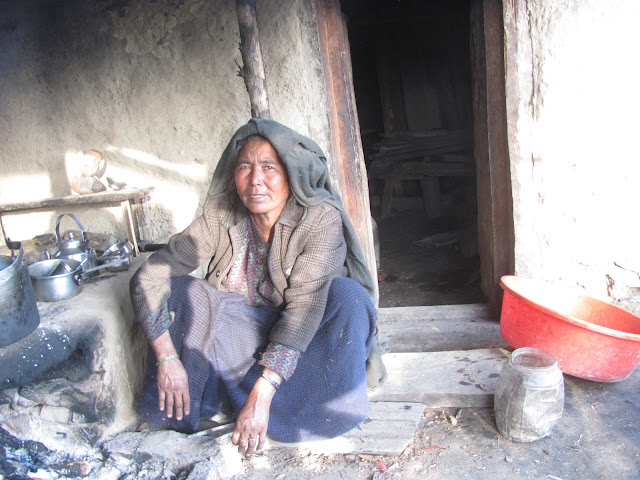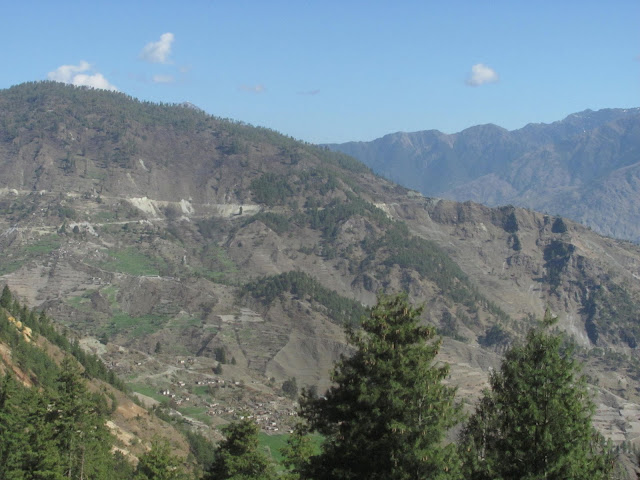On the second night of our Rara Trek, we stopped in the village of Bulbule. It is the last village in Jumla before the Gurchi Pass into Mugu. You could call it fairly remote. The main village was a strip of only a handful of houses, two of which were guesthouses as this is the main entrance to Rara Lake National Park. I was quite taken by the picturesque place and in particular our young host.
Laxmi is a young mother of two. She had an incredible air of serenity about her. I marvelled as I observed her at work, juggling handling two small children along with other village kids playing in her kitchen, running her guest house and cooking dinner for us and her family. Her husband was away in Jumla Bazaar for a few days and her brother in law and his wife were also not around that evening so she was managing everything alone. As she and Nisha talked, we found out that she was educated and in the evenings was teaching local village women to read. Along with all else she was managing! An extraordinary woman for sure. We spent a very pleasant evening in her company around the fire and enjoyed a nice meal before going to our room that was simple, but clean (by Jumla standards).
I was so taken with our new friend and her guesthouse that I wanted to stay with her again on our return from Rara Lake a few days later. We arrived in Bulbule fairly early in the afternoon having spent the morning coming back up over the pass. Although it made sense to carry on further as we still had a few hours of daylight, I had liked Bulbule and Laxmi so much, I wanted to stay there anyway. When we got to the village there was no one around so we waited a while and were about to give up and continue on to the next village when Laxmi appeared.
She looked pleased to see us, but quickly explained to Nisha that we could not stay with her that evening because she was menstruating and was sleeping in the cow shed. Her husband was still away and there was no one in the house - and because of her observance of the chaupadi custom, she could not even enter their home. She could not go into the kitchen, she could not prepare food - not even to feed her two small boys. She was really hungry as she hadn't eaten much, relying on other people in the village to give her food. We gave her a packet of biscuits, which is all we had. We even offered to cook dinner in her kitchen for her. The boys were also sleeping in the cow shed with her as no one else was there. A local village woman helped her by getting blankets from inside the house for her and the boys to sleep in the 'shed' which didn't even have walls on three sides.
I was horrified even though I am familiar with the practice of chaupadi. It has come up a lot in discussion as it is still widely practised in Nepal, particularly in the mid- and far- West. It applies to childbirth as well as menstruation. However, it is observed in varying degrees depending on where you are, the families attitudes etc. Some families just make women sleep separately and don't allow them into the kitchen but they are not made to sleep outside. This can still mean horribly cold conditions in the winter where the only source of warmth is around the kitchen fire. Some places have an actual chaupadi hut specifically for women to go to, although that in no way means it is pleasant. There is an ongoing hot debate about this archaic practice and there are many organisations working towards changing attitudes, particularly in rural areas, but of course, like any dismantling of 'tradition', it can be a slow process.
As we walked on after we'd parted company with Laxmi, we talked about how to combat this issue. How to raise awareness and change attitudes in these remote mountain areas? Even in so-called modern Nepal, educated women from middle class families (in particular Brahmins who are the most religiously strict) observe more manageable modified customs - usually not being allowed in the kitchen, eating separately from the rest of the family, not able to go to temple or attend ceremonies and celebrations (like weddings). For married women, not sleeping in the marital bed for 3-5 days, for daughters, not being able to 'touch' their fathers. If the young people of urban Nepal are still observing these rituals it is not surprising that in the rural areas, these beliefs are still in practice.
There are organisations working towards abolishing these practices. In the news just a few days ago there was an article about a group of women taking action. So that is a start, but for women like Laxmi, articles on the internet aren't going to keep her and her children warm at night in that shed.
http://en.wikipedia.org/wiki/Chhaupadi
http://www.myrepublica.com/portal/index.php?action=news_details&news_id=54180
http://www.actionworksnepal.org/program/chaupadi-free-community-jumla
Laxmi is a young mother of two. She had an incredible air of serenity about her. I marvelled as I observed her at work, juggling handling two small children along with other village kids playing in her kitchen, running her guest house and cooking dinner for us and her family. Her husband was away in Jumla Bazaar for a few days and her brother in law and his wife were also not around that evening so she was managing everything alone. As she and Nisha talked, we found out that she was educated and in the evenings was teaching local village women to read. Along with all else she was managing! An extraordinary woman for sure. We spent a very pleasant evening in her company around the fire and enjoyed a nice meal before going to our room that was simple, but clean (by Jumla standards).
I was so taken with our new friend and her guesthouse that I wanted to stay with her again on our return from Rara Lake a few days later. We arrived in Bulbule fairly early in the afternoon having spent the morning coming back up over the pass. Although it made sense to carry on further as we still had a few hours of daylight, I had liked Bulbule and Laxmi so much, I wanted to stay there anyway. When we got to the village there was no one around so we waited a while and were about to give up and continue on to the next village when Laxmi appeared.
She looked pleased to see us, but quickly explained to Nisha that we could not stay with her that evening because she was menstruating and was sleeping in the cow shed. Her husband was still away and there was no one in the house - and because of her observance of the chaupadi custom, she could not even enter their home. She could not go into the kitchen, she could not prepare food - not even to feed her two small boys. She was really hungry as she hadn't eaten much, relying on other people in the village to give her food. We gave her a packet of biscuits, which is all we had. We even offered to cook dinner in her kitchen for her. The boys were also sleeping in the cow shed with her as no one else was there. A local village woman helped her by getting blankets from inside the house for her and the boys to sleep in the 'shed' which didn't even have walls on three sides.
I tried to imagine how cold that 'shed' must be in the middle of winter.
I was horrified even though I am familiar with the practice of chaupadi. It has come up a lot in discussion as it is still widely practised in Nepal, particularly in the mid- and far- West. It applies to childbirth as well as menstruation. However, it is observed in varying degrees depending on where you are, the families attitudes etc. Some families just make women sleep separately and don't allow them into the kitchen but they are not made to sleep outside. This can still mean horribly cold conditions in the winter where the only source of warmth is around the kitchen fire. Some places have an actual chaupadi hut specifically for women to go to, although that in no way means it is pleasant. There is an ongoing hot debate about this archaic practice and there are many organisations working towards changing attitudes, particularly in rural areas, but of course, like any dismantling of 'tradition', it can be a slow process.
We talked further with Laxmi, trying to understand why she adhered to this archaic custom, even though it turned out her husband did not condone it. She explained that it was pressure from people in the village, these were their practices and it was the way it was. It just all seemed so ridiculous that she could not make money by taking our business and could not enter her own kitchen and cook dinner for her children. Here she was, this amazing, literate and educated woman and yet still so trapped in this societal structure where she couldn't stand up to the close-minded attitudes of her fellow villagers. Of course, Nisha had a lot to say about this. But it was clear that we could not persuade her to break from custom at this point.
Laxmi and another woman from the village had to go out to the fields because, of course, she still had to do her work. We walked along with them, heading to the next village and Nisha continued her heated dialogue about how they needed to make the change themselves and stand up to the old attitudes if they were to ever move forward. They knew these things to be true, but at the same time, somehow didn't feel able to take that stand.
As we walked on after we'd parted company with Laxmi, we talked about how to combat this issue. How to raise awareness and change attitudes in these remote mountain areas? Even in so-called modern Nepal, educated women from middle class families (in particular Brahmins who are the most religiously strict) observe more manageable modified customs - usually not being allowed in the kitchen, eating separately from the rest of the family, not able to go to temple or attend ceremonies and celebrations (like weddings). For married women, not sleeping in the marital bed for 3-5 days, for daughters, not being able to 'touch' their fathers. If the young people of urban Nepal are still observing these rituals it is not surprising that in the rural areas, these beliefs are still in practice.
There are organisations working towards abolishing these practices. In the news just a few days ago there was an article about a group of women taking action. So that is a start, but for women like Laxmi, articles on the internet aren't going to keep her and her children warm at night in that shed.
http://en.wikipedia.org/wiki/Chhaupadi
http://www.myrepublica.com/portal/index.php?action=news_details&news_id=54180
http://www.actionworksnepal.org/program/chaupadi-free-community-jumla
















































